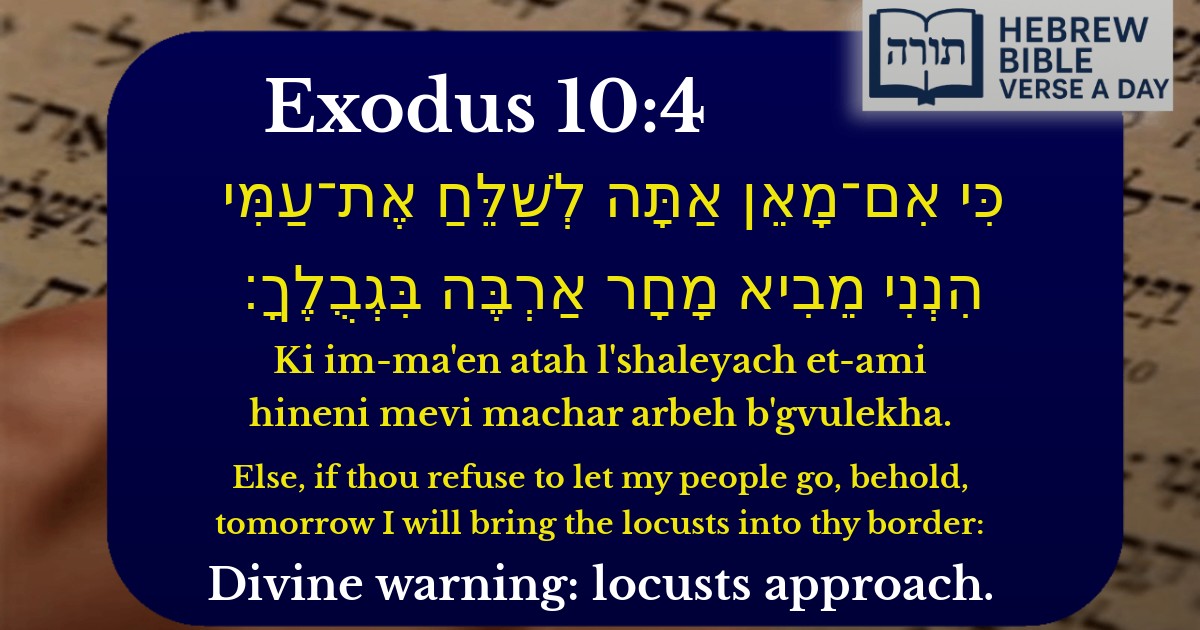Frequently Asked Questions
Q: What does Exodus 10:4 mean?
A: Exodus 10:4 is part of the narrative where Hashem warns Pharaoh through Moshe (Moses) that if he continues to refuse to let the Jewish people leave Egypt, a plague of locusts will devastate the land. This was the eighth of the Ten Plagues, demonstrating Hashem's power and Pharaoh's stubbornness.
Q: Why was the plague of locusts significant?
A: The plague of locusts was significant because it directly attacked Egypt's food supply, showing Hashem's control over nature and the consequences of defying His will. According to Rashi, the locusts were so numerous that they darkened the land, emphasizing the severity of the punishment for Pharaoh's refusal to free Bnei Yisrael (the Children of Israel).
Q: What lesson can we learn from Exodus 10:4?
A: This verse teaches us about the consequences of stubbornness and ignoring divine warnings. The Midrash explains that Hashem gave Pharaoh multiple opportunities to repent, showing His patience and justice. We learn the importance of heeding moral and spiritual warnings in our own lives.
Q: How does this verse apply today?
A: Today, this verse reminds us that Hashem is in control of the world and that resisting His will has consequences. The Rambam teaches that the Exodus story is foundational for Jewish faith, reinforcing belief in divine justice and the importance of following Torah principles.
Q: Why did Hashem say 'tomorrow' the locusts would come?
A: Rashi explains that Hashem gave Pharaoh a specific timeframe ('tomorrow') to show that the plague was not a random natural event but a deliberate divine act. This also gave Pharaoh one last chance to repent before the plague struck, highlighting Hashem's mercy even in judgment.


Context of the Verse
This verse (Exodus 10:4) is part of the narrative of the ten plagues, specifically the warning before the eighth plague—the plague of locusts. Hashem instructs Moshe to deliver this message to Pharaoh, emphasizing the consequences of his refusal to release Bnei Yisrael from slavery.
Grammatical and Linguistic Insights
The phrase "כִּי אִם־מָאֵן אַתָּה" ("Else, if thou refuse") uses the term "מָאֵן", which implies a stubborn or willful refusal. Rashi comments that Pharaoh's obstinacy was not merely passive but an active defiance of Hashem's command. The term "מָחָר" ("tomorrow") is interpreted by the Midrash (Shemot Rabbah 13:4) as indicating immediacy—Hashem would act swiftly if Pharaoh persisted in his refusal.
The Nature of the Plague
The locusts ("אַרְבֶּה") were a devastating force, as described in later verses (Exodus 10:12-15). Rambam (Moreh Nevuchim 3:46) explains that this plague targeted Egypt's agricultural wealth, demonstrating Hashem's control over nature and His ability to dismantle Egypt's economic power.
Pharaoh's Free Will and Divine Justice
The Sforno notes that this warning—like the others—was an opportunity for Pharaoh to repent. The plague was not inevitable but contingent on Pharaoh's choice. This aligns with the principle of "בדרך שאדם רוצה לילך, בה מוליכין אותו" ("In the way a person wishes to go, they are led" – Makkot 10b), highlighting that Pharaoh's hardening of heart led to escalating consequences.
Symbolism of the Locusts
Lessons in Divine Providence
The Ibn Ezra emphasizes that the specificity of "מָחָר" ("tomorrow") underscores Hashem's precision in executing justice. This plague, like the others, was meticulously timed to demonstrate that natural phenomena are instruments of Divine will when directed toward a moral purpose.